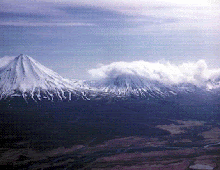
Thursday, March 26, 2009
What type of volcano is it?

What is Shishaldin's geologic location?

What is Shishaldin's eruption history?
 The Shishaldin Volcano is extremely active. It has undergone many eruptions over the past two decades, including major eruptions in 1993, 1995, 1997, and 2004. It suffered two particularly violent eruptions in 1830 and 1932, but probably the most famous of eruptions occured in 1999.Between March 13 and May 27, the Shishaldin Volcano erupted after several months of earthquakes and other signs of volcanic unrest like tremors of low frequency signifying ash explosions. When spewing ash upwards of between 15 and 20 kilometers, the Shishaldin euption reached it peak on April 19. Basaltic lava flowed down the northern flank of the mountain. It was the largest eruption seen at Shishaldin in the last 175 years. Thankfully, Shishaldin is not near enough to surrounding towns to cause severe devastation, but it did damage seismic instrumentation.
The Shishaldin Volcano is extremely active. It has undergone many eruptions over the past two decades, including major eruptions in 1993, 1995, 1997, and 2004. It suffered two particularly violent eruptions in 1830 and 1932, but probably the most famous of eruptions occured in 1999.Between March 13 and May 27, the Shishaldin Volcano erupted after several months of earthquakes and other signs of volcanic unrest like tremors of low frequency signifying ash explosions. When spewing ash upwards of between 15 and 20 kilometers, the Shishaldin euption reached it peak on April 19. Basaltic lava flowed down the northern flank of the mountain. It was the largest eruption seen at Shishaldin in the last 175 years. Thankfully, Shishaldin is not near enough to surrounding towns to cause severe devastation, but it did damage seismic instrumentation.
What is its shape?
Are there neighboring volcanoes?

Wednesday, March 25, 2009
What is Shishaldin's eruption style?

How does Shishaldin affect the environment?
Tuesday, March 24, 2009
For more...
http://www.avo.alaska.edu/pdfs/RI_2002_4.pdf
http://www.photovolcanica.com/VolcanoInfo/Shishaldin/Shishaldin.html
http://www.whistlerarenal.blogspot.com/
Citations:
Donlin, Carolyn. "U.S. Geological Survey- Reducing the Risks from Volcano Hazards." 25 Mar 2009 http://geopubs.wr.usgs.gov/fact-sheet/fs118-00/. [[info and pictures]]
"Location Map of Shishaldin Volcano, Alaska." 24 Mar 2009 http://volcanoes.usgs.gov/Imgs/Gif/Maps/Shishaldin/shish_locmap_caption.html;.
"Preliminary Hazard Assesment For Shishaldin Volcano, Alaska." 27 Mar 2009
Ritchie, David. "Earth and Volcanoes."Facts on File: Science Library. 1994.
Ritter, Michael E. The Physical Environment: an Introduction to Physical Geography.2006. Date visited. http://www.uwsp.edu/geo/faculty/ritter/geog101/textbook/title_page.html
"Shishaldin, Alaska, U.S.A.." 27 Mar 2009 http://geology.about.com/library/bl/peaks/blshishaldin.htm. [[pictures]]
"Shishaldin Volcano." 24 Mar 2009 <http://www.photovolcanica.com/VolcanoInfo/Shishaldin/Shishaldin.html%3E;.
"Updates and Information Releases." 27 Mar 2009
Quiz Questions
2. How many vents does the Shishaldin Volcano have on its western flank?
3. What island chain is Shishaldin a part of?
4. What is the definition of a stratovolcano?
5. What kind of boundary was the Shishaldin Volcano formed on?

